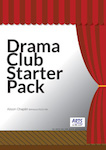RUNNING A YOUTH THEATRE
If you’re thinking of starting a youth theatre or junior drama group, these are the things you might want to consider…
Time
Do you have enough time to do this? You’ll need to arrive early and will leave late for every session. You must also factor in the time to plan your lessons, research and find appropriate materials, costumes, props, resources or equipment. You’ll also need to include extra dates for any meetings, play readings, rehearsals and performances. Expect to give up evenings and some weekends. Will you operate during the school holidays, or only in term time? How will you manage to give yourself time off? Running a youth theatre is a large time commitment, so make sure that you can give the job the time it needs.
Money
Money is also a big consideration when running a youth theatre. Unless you’re running an after-school drama club, you’ll need to find a hall to rent. Hall rental can cost a minimum of £30 an hour. Will you want to deliver sessions that are longer than one hour? Will restricting your sessions to an hour restrict your aims and what you want the children to achieve? Can you afford 90 minutes or even two hours? You will also need to spend initial funds on advertising – even home-printed leaflets cost paper and ink – plus public liability insurance and a basic DBS check. Other initial costs might include drama resource books – for lesson ideas – and play scripts, plus performing licences for any productions. These all need to be taken into consideration. Again unless you are running an after-school club, or are part of a bigger franchise, you will need to set your own fees. How much do you want members to pay? How much will they need to pay, and how many members will you need to cover all of your running costs and give you payment for your time, too? You’ll also need to factor in any payments you make to additional support staff. Plan your finances carefully before you start.
Support Staff
Legally, if you have 20 children, you will need additional adult support. Contact your local teacher training college to see if any students would like to help out. Post messages on appropriate Facebook pages to see if there are any local drama teachers who would like to run the youth theatre with you. Maybe some older teenagers on performing arts courses would be interested in a ‘community arts’ job? Ask teachers and lecturers for any recommendations. Get this staffing issue sorted before you start! Interview everyone. Insist on DBS checks and get references. Don’t employ anyone – even on a temporary or part-time basis – that you’re not 100% sure of.
Competition
Is there enough demand for a youth theatre in your area? Are there any other youth theatres or junior drama groups around? Do you live in an area where there are enough families with children to justify starting a drama group for children? Will you be competing with a franchise or any after-school clubs?
Membership
What age group do you want to work with? If you’re running an after-school club, is this going to be open to the whole school, or just KS2? Would you prefer to work exclusively with teenagers, or junior-aged children? Decide how many members you can take in one session and check the legality of your numbers. Where will your membership come from? You might need to advertise at your local schools, in community centres, or in local shops. It’s lovely to work with children who know each other but it’s even nicer to bring together a group of strangers who then become friends.
Creating a Youth Theatre Syllabus
If you decide to go ahead, you’ll need to have an overview of what you aim to deliver. The positive aspect of running your own youth theatre is that you have the creative freedom to decide what you want to teach. You can devise sessions that emphasise personal and social learning – building self-confidence, working with others, respect and consideration, empathy and understanding – or you can focus on theatre and performance skills, such as stage techniques, projection and movement. Or your lessons can be a mixture of the two. It’s a good idea to try to plan a balanced syllabus, mixing games and improvisation with performances and presentations, and using stimulus that develops the individual as well as the group. Try not to rely too heavily on drama games and simple improvisation activities as your members will soon become bored. Try to plan activities that are challenging, interesting – and fun!
Youth Theatre Performances
Think about how many performances you will stage in a year. One production per term, several mini presentations, one big production at the end of each year – or something in-between? What will parents be happy with? If you’re running an after-school club, what does the school expect? Do you have the time, the money, and the right number of children to create huge extravaganzas or will everyone be happy with two or three small performances per year? Can you afford to rent the hall for the number of rehearsals it will take to stage something big and expensive? Do you have the facilities to put on a big musical, or a play that requires a difficult set? Is the stage big enough? Do you even have a stage? Remember that most young members of a youth theatre are just happy to perform, regardless of how long, short, or extravagant the production is.
Selecting Material to Perform
Make sure any plays, sketches or other material performed are age appropriate, both for your membership and your audience. You should try to challenge your young performers at least once a year with something that stretches their imaginations, emotional responses, and abilities. Search high and low for interesting material. There are a large number of websites out there offering scripts but not all of them are written specifically for young performers. Arts On The Move provides play scripts written specifically for young actors that have been tried and tested by many youth theatre members. Don’t necessarily look to perform a ‘big’ show every time, they’re expensive and can be exhausting to direct – and how many versions of Annie or Blood Brothers do you think audiences really want to see?! Learn to be different occasionally. Find material that no one else has performed, that will appeal to your members and their families. Also think about whether you can stage productions that will appeal to everyone in your community, so that you don’t just have an audience full of doting parents, guardians and grandmas.
Essential Equipment for Your Youth Theatre
It’s a good idea to set yourself up with some essential equipment before starting. Find a big box and fill it with the following:
- masks (plain white drama masks can be purchased relatively cheaply via Amazon);
- a selection of hats – just two or three different styles will suffice;
- some small props, for example, spectacles, goblets, a magic wand, a comb, a microphone, an old mobile phone;
- a couple of beanbags and a soft ball for drama games;
- a selection of first lines, quotations or lines from plays printed on paper and laminated;
- a selection of pictures and photographs (also laminated) that could stimulate a drama;
- a selection of short scripts – monologues, duologues and short scenes. Download the Arts On The Move Simple Script!
- At least two drama books containing games and simple activities. Have a look in our Bookstore for some great titles;
- Digital recording equipment or camera;
- Sound equipment or a streaming device;
- A USB stick just for youth theatre use!
- Equipment for projecting images onto a backdrop – very nice to have but not really essential to own.
It’s also a good idea to carry a small first aid kit, some tissues, face wipes, antibacterial gel, a whistle, some pens and pencils, a notebook and a bottle of water!
Be Prepared
Get everything ready in advance. Have a register with the name of every child on it. Make sure you’re aware of any medical or behavioural issues they might have and ensure that you have a list of emergency numbers. If you’re taking money ‘at the door’ (not really advisable), make sure you have change. Go over your lesson plan several times. Visit the hall you’ll be using and do a health and safety assessment. Take a look at the Health and Safety in a Drama Setting page in our Drama in Education section. Get your DBS check sorted and make sure your insurance is in place. If possible, take a first aid course.
Be Organised
Know what your plan is for each session. Have equipment or resources ready and prepared. Make sure you know, where possible, how many children you’ll have in each session so that you can work out groupings. Plan your timings carefully and take a watch with you!
Be Consistent
Make sure you turn up for every session! If you’ve promised something the week before, make sure you deliver. If you have a thread running through three or four lessons, don’t abandon your original plan just because the children want to do something different. Be clear about what you want to achieve and your expectations, young children in particular will rise to a challenge and will often exceed your expectations of them. Decide on strategy for disruptive children and stick to it. I favour sitting any unruly children out of a lesson until they let me know – and can convince me – that they can join in again properly. However, any subsequent poor behaviour means instant exclusion from all activities for the rest of that session. If this happens three times in a term, you must speak to the parents and explain that you’re excluding the child from the group permanently. It’s harsh but only fair on the other members who have all come to learn and have fun.
Final Thoughts
Running a youth theatre is not about dictating, or even directing, it’s about enabling. Enabling each child to understand – and to reach – their full social, emotional, and creative potential. It’s about enabling children who might have had no contact with the performing arts to get involved. It’s about enabling children who have no access to drama in school to keep their creative juices flowing. It’s about enabling children to work with others in a trusted and trusting environment. The moments where nervous children speak their first line on stage, where socially challenged children join in a game for the first time, where isolated children make friends, where the group feels a sense of collective pride at the end of a show, those are the great moments. The moments when all the hard work, exhaustion and stress all feel worthwhile. Enjoy!
Arts On The Move has created a fabulous resource for anyone thinking of starting up their own youth theatre or junior drama group. The Drama Club Starter Pack includes all of the information you need to set up and run a drama group for young people including advice, practical support, 12 great lesson plans, performance material and suggestions for other activities. It costs just £12.00 for over 50 fabulous pages!
Alison Chaplin is happy to answer any questions about starting or running a youth theatre. She can be contacted via email at info@artsonthemove.co.uk or by calling +44 (0) 161 881 0868





 This site uses cookies for tracking and statistical purposes. Please read our
This site uses cookies for tracking and statistical purposes. Please read our